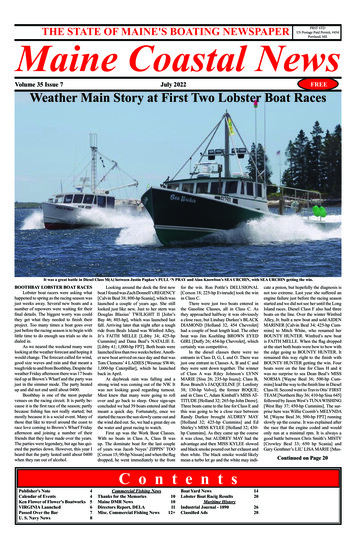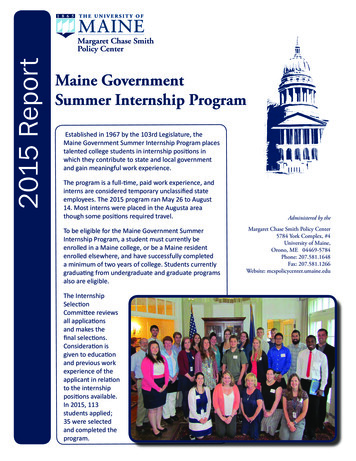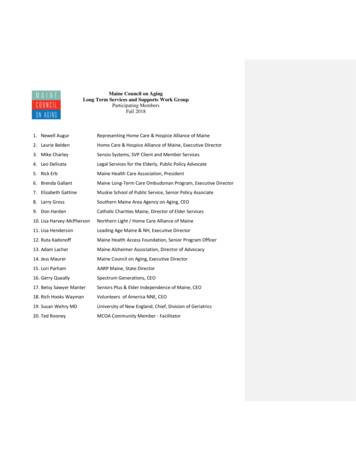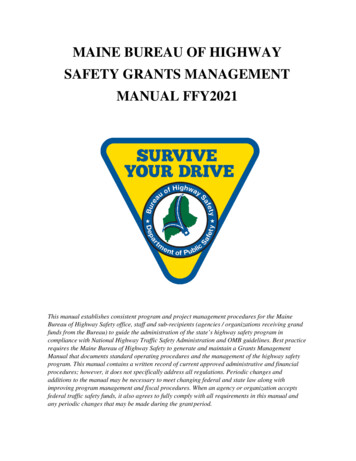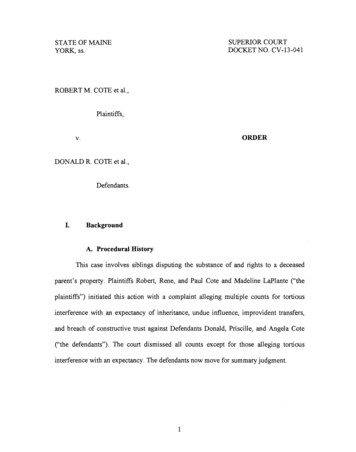
Transcription
SUPERIOR COURTDOCKET NO. CV-13-041STATE OF MAINEYORK, ss.ROBERT M. COTE et al.,Plaintiffs,ORDERv.DONALD R. COTE et al.,Defendants.I.BackgroundA. Procedural HistoryThis case involves siblings disputing the substance of and rights to a deceasedparent's property. Plaintiffs Robert, Rene, and Paul Cote and Madeline LaPlante ("theplaintiffs") initiated this action with a complaint alleging multiple counts for tortiousinterference with an expectancy of inheritance, undue influence, improvident transfers,and breach of constructive trust against Defendants Donald, Priscille, and Angela Cote("the defendants"). The court dismissed all counts except for those alleging tortiousinterference with an expectancy. The defendants now move for summary judgment.1
B. Facts1Defendants Donald Cote and Priscille Cote are siblings; Donald and Angela Coteare husband and wife. (Def.'s S.M.F. l-2i Donald and Priscille and plaintiffs Robert,Rene, Madeline, and Paul Cote are all children of Fern Cote and Pauline Cote. Fern diedin 1991 and Pauline died on September 3, 2010. (Def.'s S.M.F. 2-3.) Plaintiff PaulCote described Pauline as "frugal," "active," "strong willed," and "stubborn" before herdeath. (Def.'s S.M.F. 22.) For example, Pauline apparently continued to climb laddersto shovel snow off her roofuntil2003-2004. (Def.'s S.M.F. 25.)In 2001, Pauline executed a will that bequeathed her entire estate to her childrenin equal shares. (Pl.'s S. Add'tl. M.F. 6.) Pauline's 2001 will appointed Donald andPriscille as the personal representatives of her estate. Following Pauline's death, Donaldand Priscille were appointed co-personal representatives by the court and petitioned foran Order of Complete Settlement of the Estate on November 22, 2011. (Def.' s S.M.F. 5-6.) According to documents from the estate administration proceedings, Pauline died with 14,222.38 in two bank accounts, a number of personal items, and forty-two savingsbonds with a total value of 27,767.96. (Def.'s S.M.F. 9-11.) Funds from the bank31The plaintiffs submitted an "amended" opposition more than 21 days after the defendantsmoved for summary judgment. M.R. Evid. 7(c)(2). Because the responses to material facts in theamended opposition do not substantially differ and the additional statements of material fact arethe same, the court considers the late filing in ruling on the motion. Ultimately, the defendants arenot prejudiced because the outcome is the same. The court denies the defendants' request forsanctions.2"De f.'s S.M.F." refers to Donald and Angela's statement of material facts. Priscille' sseparate statement of material facts is abbreviated "Def. P.C. 's S.M.F."3The plaintiffs deny or qualify that these assets were the extent of the estate at Pauline'sdeath. Madeline claimed that she believed her mother did not die penniless. (Def.'s S.M.F., 41.)The plaintiffs repeatedly state they "believe Pauline Cote had substantial assets at the time of herdeath." (Pl.'s Resp. Def. 's S.M.F. ,, 11-12.) The plaintiffs also deny that the personal items andbonds were properly distributed, but fail to substantiate this denial.2
account were used to pay estate expenses, which exceeded available funds. (Def. P. C.'sS.M.F. 8-9.)In 1995, Pauline conveyed her home at 190 Saco Avenue, Old Orchard Beach,Maine, to Priscille and Donald as joint tenants. Pauline retained a life estate in theproperty. (Def.'s S.M.F. 4.) The plaintiffs allege that the defendants hold 164,000 inproceeds from a sale of that home in personal bank accounts. (Pl.'s Resp. Def. P.C.'sS.M.F. 6.) The plaintiffs allege Pauline told them that funds from a sale would bedistributed to all the Cote children. 4At the time Pauline died, she held several accounts that passed outside of probate:a Banker's Life annuity totaling 76,502.66, a MetLife annuity totaling 21,258.10, and aMetLife insurance policy totaling 18,251.00. (Def.'s S.M.F. 13-14.) Each accountlisted Donald and Priscille as pay-on-death beneficiaries. (Def.'s S.M.F. 19.) In 2001,Pauline changed the beneficiaries from Madeline (LaPlante) and Jean Cote to Donald andPriscille. (Def.'s S.M.F. 31.) Robert and Madeline do not know why the beneficiaryform was changed. (Def.'s S.M.F. 33, 40.) The defendants maintain that assetsreported in the probate proceeding were all the assets held by Pauline at her death. (Def.P. C.'s S.M.F. 18.) The plaintiffs deny this and allege Pauline had "substantial" assets. 5Robert Cote filed an objection to the Order of Complete Settlement of the Estate on4Robert's affidavit states the Pauline told him that she "had deeded [the home] to Donald andPriscille a few years after Dad died. They would hold it until her death. Then they would sell itand split the proceeds among all the adult kids. Her Will provided the same ground rules."(Robert Cote Aff. 'if 51.) Rene's affidavit similarly recounts that Pauline said the proceeds fromthe house would be split amongst the children. (Rene Cote Aff. 'j['j[ 21-22.) While Pauline'sstatements about this plan were hearsay, they could be construed as statements of intent underRule 803(3). The court addresses the merit of the plaintiffs' claim to these funds below.5For example, Robert's affidavit claims Fern had a valuable stamp collection that was left toPauline. (Pl.'s S. Add'tl. M.F. 'j['j[ 29-30.)3
January 12, 2012. (Def.'s S.M.F. 7.) This suit was filed in February 2013. (Def.'sS.M.F. 8.)Robert Cote alleged in his deposition that the defendants "manipulated" Paulineto "change everything into their names." (Def.'s S.M.F. 28/ Robert also testified thatFern and Pauline had a number of CDs that were intended to go to the Cote children.(Pl.'s Resp. Def.'s S.M.F. 30l Around 2008 or 2009, Robert inquired as to the statusof Fern's old bank accounts and received no information from Donald or Priscille. (Pl.'sS. Add'tl. M.F. 34l The plaintiffs allege a number of other accounts existed andcertain promises were made, including to help Paul purchase a tractor. (Pl.'s S. Add'tl.M.F. 40-44, 46-52.) Paul believed there was a money market account 9 at Saco6The plaintiffs attempt to deny this by asserting Robert said many other things. This is notproperly controverted and thus deemed admitted.7The plaintiffs allege that Priscille used Pauline's money to pay for her child's collegeeducation. (Pl.'s S. Add'tl. M.F. 11 19-20.) In his affidavit, Robert claims that he "ended uplearning there had been several checks made out to Priscille Piper Cote" that the defendants "hadprobably arranged to find its way to Washington State University." (Robert Cote Aff. 1 20.)Robert does not state where or how he received this information or whether it was anunconfirmed belief. As Robert appears to lack personal knowledge, these facts are inadmissibleand will not be considered by the court in ruling on summary judgment. M.R. Civ. P. 56(e); M.R.Evid. 602.8Robert also believes that the defendants manipulated Pauline into signing over access to theaccounts. (Pl.'s S. Add'tl. M.F. 1 35.) The basis for that belief appears to be speculation drawnfrom what Pauline told Robert: "Pauline would talk about signing paperwork . at the insistenceof Donald and Priscille." (Pl.'s S. Add'tl. M.F. 1 37.) What Pauline said is inadmissible hearsaybecause the plaintiffs seek to offer the out-of-court statement to prove the truth of the fact Donaldand Priscille forced Pauline to sign documents. M.R. Evid. 801, 802. Even if admissible, thestatements do not support the proposition stated: the fact Pauline signed documents does notindicate that Pauline signed over control of her accounts. Robert only speculates that this is whatoccurred: "I am not sure what happened . It appears they only needed her to sign one piece ofpaper and they were able to empty many accounts." (Robert Cote Aff. 1 44.) The court disregardsthis evidence in considering the summary judgment motion. M.R. Civ. P. 56(e); M.R. Evid. 602.The issue is addressed further below.9Paul alleges that the defendants "somehow" manipulated the account into their controlthrough undue influence on Pauline. The allegation that the money market account wasmanipulated by the defendants is inadmissible because like Robert, Paul only speculates that thisis what occurred. M.R. Civ. P. 56(e); M.R. Evid. 602.4
Biddeford Savings. (Pl.'s Resp. Def.'s S.M.F. 36; Pl.'s S. Add'tl. M.F. 35). Paul'saffidavit states:At some point after 1999, my sister Priscille got power of attorney frommy mother and put Donald's name on that account that my mother had setup for me. She took my name off the account.(Paul Cote Aff. 15. ) 10 Paul's affidavit also describes a number of accounts held by F emCote. (Pl.'s S. Add'tl. M.F. 69-72.)11Renee and Paul Cote both testified that Donald and Priscille "controlled" Pauline.(Pl.'s Resp. Def.'s S.M.F. 22, 24, 26.) Donald and Priscille were named as financialpowers of attorney for Pauline in 1995. (Pl.'s S. Add'tl. M.F. 13.) Priscille managedPauline's finances from 2006 until she died in 2010. (Pl.'s S. Add'tl. M.F. 8.) Paulinegave Angela Cote checks to cover heating oil costs. (Pl.'s Resp. Def.'s S.M.F. 37.)Madeline alleges Pauline was not permitted to have a checkbook and had to ask Donaldor Priscille for money to purchase gifts for family members. (Pl.'s S. Add'tl. M.F. 85.) 12 Pauline was the victim of a "scam" in 2006 that resulted in a withdrawal of 20,000 from one of her bank accounts. (Pl.'s S. Add'tl. M.F. 15.)Towards the end of Pauline's life, she was in a weakened state after suffering astroke in 2008. Priscille sometimes locked Pauline inside her home alone. (Pl.'s S.10Paul's affidavit does not explain how or why he was removed from the account and wasunable to point to any specific wrongdoing by the defendants other than his suspicion that thedefendants were responsible.11As Fern Cote died almost twenty years before Pauline, the relevance of these accounts tothis action is not clear, though the plaintiffs appear to rely on these to support their contention thatPauline should have died with "substantial assets."12Madeline's affidavit has similar deficiencies as Robert's, as it contains inadmissiblehearsay and assertions about matters that do not affirmatively establish that they are based onpersonal knowledge. M.R. Civ. P. 56(e); M.R. Evid. 602, 801, 802; Wescottv. Allstate Ins., 397A.2d 156, 164 (Me. 1979) (stating affiant must "affirmatively" state that they have personalknowledge and such competence to testify must be "obvious").5
Add'tl. M.F. 16-17.) 13 Priscille did not consult the other siblings about importantdecisions regarding Pauline and consulted only Donald about having Pauline move inwith Priscille after her stroke. (Def.'s Resp. Pl.'s S. Add'tl. M.F. 18.) Affidavits by Pauland Robert claim Priscille, Donald, and Angela interfered with their efforts to spend timewith Pauline. (Pl.'s S. Add'tl. M.F. 19-20.) Madeline tried to move in with Pauline,but was ordered out by Priscille. (Pl.'s S. Add'tl. M.F. 23-24.) Priscille moved in withPauline and hired a caretaker, Helen, to care for Pauline while Priscille was at work.(Pl.'s S. Add'tl. M.F. 26.) During this time, Priscille apparently did not provideinformation to Robert about Pauline's welfare. (Pl.'s S. Add'tl. M.F. 32.)Priscille had previously brought Pauline to an attorney, Mary Toole, who drew upthe 1995 deed for the home, the power of attorney for Priscille and Donald, and Pauline's2001 will. (Pl.'s S. Add'tl. M.F. 9-10, 14.) Paul later tried to arrange a family meetingof the Cote children to arrange for Pauline to get a new attorney. (Pl.'s S. Add'tl. M.F. 64-65.) Paul apparently sought to arrange this meeting because Pauline told him shewanted to remove Priscille from power of attorney and Donald from being executor ofthe will, but Pauline later changed her mind. (Pl.'s S. Add'tl. M.F. 62-63.i 4 WhenPriscille found out about the plan for Pauline to change attorneys at a family gathering,she grabbed Paul and said "you won't get this (change) without a fight from me!" (Pl.'sS. Add'tl. M.F. 66; Paul Cote Aff. 35.) Pauline ultimately decided she did not wish tochange attorneys. (Pl.'s S. Add'tl. M.F. 67-68.)Paul alleges that Priscille told him he would "never get a penny" from Pauline'sestate. (Pl.'s S. Add'tl. M.F. 55.) Mter Pauline's death, Paul went to Donald and13The parties dispute whether and who changed the locks to Pauline's home.Pauline's statement is hearsay but admissible as a statement of intent under the state ofmind exception. M.R. Evid. 803(3).146
Angela's home to discuss the estate. Angela became agitated and shouted "when are allyou losers going to accept the fact that Mom and Dad only wanted Donald and Priscilleas children-and not the rest of you losers?" (Pl.'s S. Add'tl. M.F. 60.) Donald thentold Paul "if you don't like [what is going on with Pauline's estate], you can take me tocourt, but in the meantime, I will enjoy spending your money." (Pl.'s S. Add'tl. M.F.IT. DiscussionA. Summary Judgment Standard"Summary judgment is appropriate if the record reflects that there is no genuineissue of material fact and the movant is entitled to judgment as a matter of law." Dussaultv. RRE Coach Lantern Holdings, LLC, 2014 ME 8, 12, 86 A.3d 52. The court draws"all reasonable inferences in favor of the non-moving party while ignoring conclusoryallegations, improbable inferences, and unsupported speculation." Balser v. Int 'l Union ofElec., Elec., Salaried, Mach. & Furniture Workers (IUE) Local 201, 661 F.3d 109, 118(1st Cir. 2011) (citations and internal quotation marks omitted). A party opposingsummary judgment must "come forward with affidavits or other materials setting forth bycompetent proof specific facts that would be admissible in evidence to show . that agenuine issue of fact exists." Bangor & A. R. Co. v. Daigle, 607 A.2d 533, 535-36 (Me.1992). "Evidence of factual elements offered to prove a claimed tort . need not bepersuasive at [the summary judgment] stage, but the evidence must be sufficient to allowa fact-finder to make a factual determination without speculating." Estate of Smith v.Cumberland Cnty., 2013 ME 13, 19, 60 A.3d 759.15The defendants object to the statements by Priscille, Donald, and Angela on hearsaygrounds. Statements by Priscille, Angela, and Donald are all admissible under the exclusion fromthe hearsay definition as admissions by party opponents. M.R. Evid. 801(d)(2).7
B. Tortious Interference with An ExpectancyA prima facie case requires the plaintiff to establish:(1) the existence of an expectancy of inheritance; (2) an intentionalinterference by a defendant through tortious conduct, such as fraud,duress, or undue influence; (3) a reasonable certainty that the expectancyof inheritance would have been realized but for the defendant'sinterference; and (4) damage resulting from that interference.Morrill v. Morrill, 1998 ME 133, 7, 712 A.2d 1039. The fact a plaintiff is thedecedent's child can be sufficient for a fact-finder to infer the plaintiff has an expectationof an inheritance. Id. 8. In addition to testamentary bequests that pass through probate,non-probate devices and accounts that pass property by contract can constitute anexpectancy. Morrill v. Morrill, 679 A.2d 519, 521 (Me. 1996).The parties do not dispute the first element. An expectation of an inheritanceexisted because the plaintiffs were to receive a share of the estate under the 2001 will.Ultimately, however, there were insufficient funds in the estate for distributions to bemade to them. The plaintiffs allege that the defendants tortiously induced Pauline to makeinter vivos transfers of property or change beneficiary forms in a scheme to deplete ordivert funds that they would have received. Cyr v. Cote, 396 A.2d 1013, 1017 (Me. 1979)(tortious interference claim based on real estate and a savings account that would havepassed to plaintiff, but for alleged undue influence resulting in inter-vivos transfers). Inproceeding under this "depletion" theory, the plaintiffs must "present evidence on thesource, nature and extent of the expected inheritance" with which the defendantsinterfered. Morrill, 1998 ME 133, 8, 712 A.2d 1039. In other words, that certainproperty existed that should have, but did not go to them because of the defendants'tortious conduct. This goes to the second element: whether the defendants intentionallyinterfered. The plaintiffs allege undue influence. (Pl.'s Opp. Summ. J. 9-12.)8
1. Undue Influence and Confidential Relationships"Undue influence is unfair persuasion of a party who is under the domination ofthe person exercising the persuasion or who by virtue of the relation between them isjustified in assuming that that person will not act in a manner inconsistent with hiswelfare." Russo v. Miller, 559 A.2d 354, 358 (Me. 1989). A presumption of undueinfluence arises if the plaintiff can establish, by a preponderance of the evidence, a"confidentialrelationship"betweenTheriault v. Burnham, 2010 ME 82, thedecedentandthedefendant.6, 2 A. 3d 324. A "confidential relationship" existswhere there is "trust and confidence in fact by one party in another and a great disparityof position and influence between the parties to the relation." Ruebsamen v. Maddocks,340 A.2d 31, 35 (Me. 1975). The party must also receive a benefit from the undueinfluence. Id. at 37. "The existence of a confidential relationship is a question of fact."&tate ofCampbell, 1997 ME 212, 6, 704 A.2d 329.In Estate of Campbell, the Law Court affirmed the finding that a confidentialrelationship arose and was abused: the decedent was 85 and in failing health, thedefendant was responsible for the decedent's finances, the defendant initiated a transferof two cottage properties to himself and told the decedent the properties would remain inthe family and funds would be used to pay for her nursing home, and concealed thetransfer from other family members. 1997 ME 212, 704 A.2d 329. Under thesecircumstances, the court employed equitable powers to impose a constructive trust overthe properties. 1616The plaintiff did not assert a claim for tortious interference with an expectancy, so this wasnot addressed by the court.9
In Theriault v. Burnham, the Law Court concluded there was sufficient evidenceof a confidential relationship to support a jury's damage award for tortious interferencewith an expectancy. hecourt pointed to the following facts that supported the findingthat defendant Burnham unduly influenced the decedent Dingley :(1) Burnham pressured Dingley to change her will, threatening to leaveher unassisted if she did not leave Kent's Landing to him; (2) Burnhamtook Dingley to his lawyer to have her will changed; (3) Burnhamseparated Dingley from others who might influence her decision; (4)Burnham began to evict another devisee from Kent's Landing overDingley's expressed preference and without her consent; (5) Burnham'slawyer represented Dingley in the eviction proceedings; (6) Burnhamwould not let Dingley see the new will after its execution; (7) Burnhamwas Dingley's power of attorney and health care agent; and (8) Dingleywas dependent on Burnham to transport her, cook her meals, and write allof her checks. This evidence also supports a finding that Burnham had aconfidential relationship with Dingley.2010 ME 82, 7, 2 A.3d 324.The following undisputed facts suggest that a confidential relationship existedbetween Pauline and the defendants: (1) Priscille brought Pauline to Attorney MaryToole, who Priscille chose; (2) Priscille and Donald acquired power of attorney in 1995;(3) the home was deeded to Priscille and Donald the same year; (4) Pauline's will waschanged in 2001, after Priscille and Donald became more involved; (5) Mary Toole drewup the power of attorney, the deed, and the 2001 will; (6) Pauline depended on Priscille,Donald, and Angela for care, transportation, and management of her finances; (7)Priscille, Donald, and Angela all limited the ability of the plaintiffs to spend time withPauline and learn information about her wellbeing. Viewing these facts in light mostfavorable to the plaintiffs, there is prima facie evidence of a confidential relationship.With disputed issues of material fact, the defendants are unable to defeat this presumptionon summary judgment.10
While this conclusion would effectively shift the burden to the defendants todisprove undue influence, the mere fact that a confidential relationship existed and thedefendants received property from Pauline does not necessarily render the defendantsliable for tortious interference:The law does not prohibit a party in a confidential relationship fromtransferring property to the superior party in the relationship, even by gift.Rather, the law seeks to ensure that transfers within these types ofrelationships are the true intent of the grantor and not the product of fraudor undue influence on the part of the grantee.Morrill, 1998 ME 133, 5, 712 A.2d 1039. The court was clear that a plaintiff retains theburden of proof on the other three elements. See id. 5-7. (discussing that undueinfluence burden-shifting does not alleviate the plaintiff's burden to establish prima facieevidence on remaining elements of tortious interference of an expectancy). The nextelement requires the plaintiffs prove to a "reasonable certainty" the nature and extent oftheir expected inheritance that would have been realized but for undue influence of thedefendants. !d. 7.2."Reasonable Certainty" of ExpectancyA plaintiff must establish "proof amounting to a reasonable degree of certaintythat the bequest or devise would have been in effect at the time of the death of thetestator" but for the defendant's tortious interference. Restatement (Second) of Torts, §774B cmt. d (1979); see also Plimpton v. Gerrard, 668 A.2d 882, 886 (Me. 1995)(adopting Restatement). Establishing causation to a "reasonable certainty" requires"proof of a high degree of probability" that the defendant was a "but for" cause thatdeprived the plaintiff of an expected inheritance. !d. Plaintiffs must also prove the11
"extent" of the expectancy, as in the amount or value, to a "reasonable degree ofcertainty." Morrill, 19981\IIE 133, 8-9, 712 A.2d 1039.The defendants argue that the scope of assets the plaintiffs allege they weredeprived of "is vague at best and totally illusory at worst." (Def.'s Mot. Summ. J. 11.)Plaintiffs respond that the life insurance policy to which Madeline was at one time abeneficiary, "various" money market accounts, and "various" CD accounts constitutedassets that were expected inheritances. (Pl.'s Opp. Def's Mot. Summ. J. 13.) While theplaintiffs make rather vague references to account documents and conversations withPauline, some several decades in the past, there is evidence in the record that theplaintiffs were at some time beneficiaries to non-probate devices and bank accounts.(Pl.'s S. Add'tl M.F. 40-44, 46-52.) This is likely sufficient evidence of the "extent" ofthe expectancy at the summary judgment stage. The plaintiffs are not required to provethe expectancy "with exactitude." Morrill, 19981\IIE 133, 8, 712 A.2d 1039.There are, however, serious deficiencies in the other evidence the plaintiffs relyupon to prove that the defendants' conduct was a "but for" cause that deprived them ofthe expectancy. Key portions of the affidavits relied upon by the plaintiffs are fraughtwith hearsay and ambiguity as to whether the affiant had personal knowledge of thematter asserted. 17 In relevant part, Rule 56( e) states:Supporting and opposing affidavits shall be made on personal knowledge,shall set forth such facts as would be admissible in evidence, and shallshow affirmatively that the affiant is competent to testify to the mattersstated therein. When a motion for summary judgment is made andsupported as provided in this rule, an adverse party may not rest upon themere allegations or denials of that party's pleading, but must respond byaffidavits or as otherwise provided in this rule, setting forth specific factsshowing that there is a genuine issue for trial.17See supra notes 7, 8, 9, 10, and 12 for a discussion of the particular deficiencies in specificaffidavits underlying the plaintiffs' material facts.12
M.R. Civ. P. 56(e).An affidavit from an interested witness can establish or dispute a material fact.Stanley v. Hancock Cnty. Comm'rs, 2004 "ME 157, 19, 864 A.2d 169; see alsoFuhrmann v. Staples the Office Superstore E., Inc., 2012 "ME 135, 16, 58 A.3d 1083(noting "'self-serving' statements and circumstantial evidence can be used to establish ordispute a material fact"). On the other hand, an affiant's self-serving, conclusory, andunsupported assertion that he or she has personal knowledge may be insufficient toestablish or dispute a material fact. Beneficial Me. Inc. v. Carter, 2011 "ME 77, 15, 25A.3d 96 (affidavit failed to state the basis for personal knowledge). Affidavits made "oninformation and belief' may comply with the rule "provided that, when viewed in itsentirety, it 'shows obviously that all pertinent parts thereof were made from personalknowledge' of the affiant."Wescott v. Allstate Ins., 397 A.2d 156, 164 (Me. 1979)(citation omitted). The affiant "must show affirmatively" that he or she has personalknowledge of the matters asserted. !d. (emphasis added); see also Colby v. York Cnty.Comm 'rs, 442 A.2d 544, 548 (Me. 1982) (holding that because affiant failed to state hewas present at the hearing described in the affidavit, personal knowledge was notobvious, and thus affidavit was legally insufficient under Rule 56).In opposing summary judgment, the plaintiffs rely on inadmissible hearsay.Affidavits submitted by Paul, Madeline, Rene, and Robert all contain assertions that relyon statements Fern and Pauline made to them while they were alive. Assuming some ofPauline's promises to the plaintiffs about intended bequests may be admissible underRule 803(3), that exception has limits. See Estate of Utterback, 521 A.2d 1184, 118813
(Me. 1987). The exception for then existing mental, emotional, or physical conditionstates:A statement of the declarant's then ex1stmg state of mind, emotion,sensation, or physical condition such as intent, plan, motive, design,mental feeling, pain, and bodily health, but not including a statement ofmemory or belief to prove the fact remembered or believed unless itrelates to the execution, revocation, identification, or terms of declarant'swill.M.R. Evid. 803(3).Particularly important to plaintiffs' proof of tortious conduct and causation arestatements by Pauline about signing papers: "Pauline would talk about signing paperwork. at the insistence of Donald and Priscille." (Pl.'s S. Add'tl. M.F. 37.) This is astatement about what occurred in the past-that Priscille and Donald had made Paulinesign documents. Unlike some of Pauline's other statements, these statements are notadmissible under Rule 803(3) because they are a fact remembered rather than a statementof future intent. See Field & Murray, Maine Evidence § 803.3 at 474 (6th ed. 2007)(quoting Justice Cardozo: "Declarations of intention, casting light upon the future, havebeen sharply distinguished from declarations of memory, pointing backward to the past.There would be an end, or nearly that, to the rule against hearsay if the distinction wereignored.") The statements are inadmissible hearsay because the plaintiffs offer them toprove that Donald and Priscille made Pauline sign documents. Cf Morrill, 1998 ME 133, 4, 712 A.2d 1039 (decedent's statements that child was a "loser" and "financiallyirresponsible" offered to prove parent's view of the child, not that the child was in fact aloser).Other allegations of wrongdoing in Paul, Madeline, and Robert's affidavits do notclearly indicate the affiant has personal knowledge or appear to be phrased in a manner14
intended to circumvent an objection. See, e.g., (Robert Cote Aff. 20, stating he "endedup learning there had been several checks made out to Priscille Piper Cote" that thedefendants "had probably arranged to find its way to Washington State University"). Thistestimony plainly fails to comply with Rule 56. A party cannot phrase averments in anaffidavit in manner to avoid objections for lack of personal knowledge and hearsay wherethe assertions are offered for their truth. Lubar v. Connelly, 2014 ME 17, 42, 86 A.3d642.Fatally, the plaintiffs have not adduced prima facie evidence of causation. Most ofthe plaintiffs' evidence of annuities, money market accounts, and CDs in their names andthe alleged changed occurred prior to when Priscille began to control Pauline's financesin 2006. (Pl.'s S. Add'tl. M.F. 8.) The only direct evidence that a change was made thatcausally deprived any plaintiff of an expected inheritance was the change of beneficiaryform that removed Madeline. The plaintiffs do not know why or how this change wasmade, nor do they substantiate the allegation Donald or Priscille employed undueinfluence to change the form. It is not enough to prove the change was made; theplaintiffs must come forward with evidence the defendants were a "but for" cause thatdeprived the plaintiffs of the expectancy. (Def.'s S.M.F. 33, 40.) The only evidencethat marginally supports the plaintiffs' theory of wrongdoing derives from Pauline'sstatements about signing documents, which is inadmissible hearsay for the reasonsexplained above. Yet even if Pauline's statements about signing documents wereadmissible, the plaintiffs put forth no evidence as to what the documents were, whetherthey governed accounts that had been in their names, or how the defendants used thedocuments to interfere with their expectancy. The plaintiffs offer suspicions that would15
not be admissible at trial. This is most clearly illustrated by Robert's affidavit, whichstates in relevant part: "I am not sure what happened . It appears they only needed herto sign one
85.)12 Pauline was the victim of a "scam" in 2006 that resulted in a withdrawal of 20,000 from one of her bank accounts. (Pl.'s S. Add'tl. M.F. 15.) Towards the end of Pauline's life, she was in a weakened state after suffering a stroke in 2008. Priscille sometimes locked Pauline inside her home alone. (Pl.'s S.


